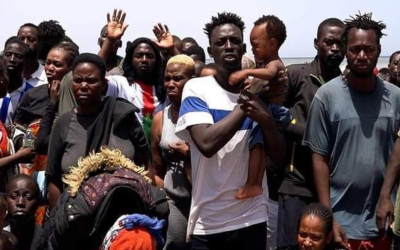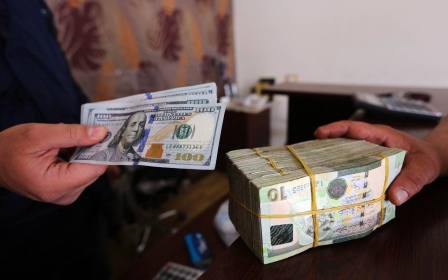Libya's foreign minister fired after meeting Israeli counterpart

Libya’s Foreign Minister Najla al-Mangoush has been dismissed from her post after she met her Israeli counterpart in Italy last week.
Her dismissal, first reported by Al Jazeera, comes after she was suspended from her role on Sunday and shortly afterwards fled the country and headed to Turkey.
There is also mounting pressure on the Libyan government to explain how Mangoush left Libya when she was on a list of people barred from leaving the country pending the conclusion of an investigation.
The meeting between Mangoush and Israeli Foreign Minister Eli Cohen was a first for the two countries.
Libya and Israel have no official ties and the meeting between the two ministers sparked protests in Tripoli and other cities in the country. Protesters were seen waving Palestinian flags and blocking roads.
New MEE newsletter: Jerusalem Dispatch
Sign up to get the latest insights and analysis on Israel-Palestine, alongside Turkey Unpacked and other MEE newsletters
The news about their meeting was first announced by Cohen, who said: "I spoke with the [Libyan] foreign minister about the great potential for the two countries from their relations."
The Israeli side portrayed the meeting as a first step towards normalisation.
Since 2020, Israel has normalised ties with the United Arab Emirates, Bahrain, Morocco and Sudan in a series of deals brokered by the United States. Saudi Arabia is also reported to be considering normalising ties with Israel.
Following Cohen's announcement and the backlash, the head of Libya's Tripoli-based Government of National Unity (GNU), Abdulhamid al-Dbeibah, suspended Mangoush and referred her to an investigation.
Libya's foreign ministry said Mangoush had rejected a meeting with representatives of Israel and that what had occurred was "an unprepared, casual encounter”.
The Libyan ministry's statement said the interaction did not include "any discussions, agreements or consultations", and added the ministry "renews its complete and absolute rejection of normalisation" with Israel.
An Israeli official then seemed to contradict that account telling Reuters that the meeting had been agreed in advance "at the highest levels" in Libya and lasted more than two hours.
The Israeli official said that “the Libya prime minister sees Israel as a possible bridge to the West and the US administration".
That account also seems to tally with with what two Libyan officials told the Associated Press (AP).
One official told the AP that meeting was officially coordianted last month when Dbeibah was on a visit to Italy meeting his counterpart Giorgia Meloni.
On her return to Libya, Mangoush immediately briefed the Libyan prime minister after she met the Israeli foreign minister, said another Libyan official.
The accounts also seemingly contradict the statements released by the foreign ministry that the meeting happened without the knowledge of the Dbeibah and was uncordinated.
According to reports, the prospect of normalisation between Libya and Israel was first discussed in a meeting between Dbeibah and CIA Director William Burns, who visited the country in January.
Burns, according to reports, had encouraged Dbeibah’s government to join the four other Arab countries and normalise relations with Israel.
While Dbeibah gave initial approval to the idea he was worried about the public backlash in a country that has long shown strong support and aid for the Palestinians.
Italian broker
The meeting was facilitated by Italian Foreign Minister Antonio Tajani, Israel's foreign ministry said, adding they had discussed possible cooperation and Israeli aid in humanitarian issues, agriculture and water management.
Cohen said he had also spoken to Mangoush about the importance of preserving Jewish heritage in Libya.
It’s important not to assume that the meeting between Mangoush and Cohen was pushed by the US, said Libya expert Jalel Harchaoui and associate fellow at the Royal United Services Institute.
“I mean, typically the attitude of the US is to say, if you can normalise relations with Israel, it's a good thing, but it's not pushing specifically one country or another. Usually it's the initiative of the nation,” Harchaoui told Middle East Eye.
Similarly, Saudi Arabia’s Mohammed bin Salman, said Harchaoui, has gone to the US and has given a list of things it wants, and if they get these “goodies and gifts, maybe Saudi Arabia will consider normalisation.”
It’s more likely that Dbeibah has assumed that the US would appreciate the gesture, said Harchaoui.
Italy’s role in making the meeting happen should also not be understated.
The Italian premier is very close to the Israeli Prime Minister Benjamin Netanyahu and Meloni “would also love to show a foreign policy victory”, said Harchaoui.
“We know that it happened in Rome and it couldn't have happened without the active facilitation and help of the Meloni government.”
Israeli fallout
In Israel, Cohen’s public announcement of the secret meeting has been called a “diplomatic farce”, with critics saying the fallout has possibly set back the country’s diplomatic overtures to other countries.
Israeli analyst Yonatan Touval said that foreign ministry officials were dismayed by Cohen’s public announcement.
"Israeli FM Eli Cohen seeks a headline as a junkie craves a fix," Touval quoted senior diplomatic officials as telling him. "In his quest for a quick fix, he's throwing Israeli diplomacy down the drain."
Israeli opposition politician and former prime minister Yair Lapid said that Cohen had seriously undermined Israel's credibility on the international stage.
In a series of posts on X, the platform formerly known as Twitter, Lapid said that today many countries will be wondering whether Israel is a “country with which we can conduct foreign relations? Is this a country you can trust?”
“This is what happens when you appoint Eli Cohen, a person with no background in the field, as foreign minister for only one year,” Lapid said.
Internal divisions
Any Israeli effort to strengthen ties with Libya could be complicated by Libya's bitter internal divisions. The country is divided between the GNU, which rules the west, and an administration in the east dominated by eastern commander Khalifa Haftar.
Libya's GNU was installed in early 2021 through a UN-backed peace process but its legitimacy has been challenged since early 2022 by the eastern-based parliament after a failed attempt to hold an election.
Previous foreign policy moves by the GNU, including agreements it has reached with Turkey, have been rejected by the parliament and subject to legal challenges.
Repeated international efforts, driven largely by the United Nations, have failed to result in a unified government, though some headway was made when the Libyan central bank earlier this month said it was reunifying.
Middle East Eye delivers independent and unrivalled coverage and analysis of the Middle East, North Africa and beyond. To learn more about republishing this content and the associated fees, please fill out this form. More about MEE can be found here.





